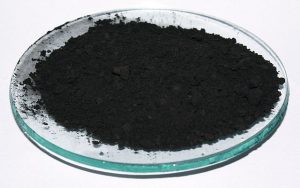Copper is included in thyroid supplements because it is essential to overall health and may indirectly support thyroid function.

- Supporting overall health. Copper aids the body’s antioxidant defenses and has other roles that may indirectly support the thyroid.
Overview
Copper (Cu) is an essential trace mineral because the body requires it in tiny amounts for proper function. Most notably, copper is involved in energy production, blood cell & hemoglobin formation, and antioxidant protection.
In addition, copper is believed to play a role in thyroid health, although its exact effects and mechanisms are poorly understood. One reason for this is the fact that copper interacts with other minerals involved in thyroid function, such as iron, selenium, and zinc.
Because of this, some people believe that copper deficiency can negatively impact thyroid function. However, current research evidence does not support this theory. For example, one study found that even severely copper-deficient rats had normal thyroid function and hormone levels. Furthermore, copper deficiency is extremely rare in the modern world.

Copper and the thyroid – is there a link?
How Copper Might Help With Thyroid Health
Supporting Overall Health
Copper, iron, and zinc are known to influence thyroid function, but their effects are not as well understood as those of iodine and selenium.
Some researchers have proposed that copper can indirectly supports thyroid function by: 1
- Supporting the function of antioxidant enzymes, which among their many functions help protect the thyroid from oxidative damage
- Helping synthesize a type of fats called phospholipids, which interact with thyroid-stimulating hormone
- Supporting the metabolism of tyrosine, an amino acid required for thyroid hormone production
However, these mechanisms remain hypothetical and require further research.
Copper Popular Uses for Thyroid Health
Copper is frequently used as an ingredient in thyroid support products – supplements meant to help with hypothyroidism. However, this use is not supported by research because studies have not found a significant link between copper levels and thyroid function. Moreover, copper deficiency is extremely rare.
Research
Animal Research
Severe copper deficiency does not appear to have any significant impact on thyroid hormone in rats
The goal of this animal study was to examine whether copper deficiency has any impact on thyroid hormone levels. Twenty-four male rats were fed a normal or copper-deficient diet for 40 days, resulting in a state of severe copper deficiency. When examined, copper-deficient rats had a higher T3 concentration, while their levels of T4 and the activity of monodeiodinase – the enzyme which converts T4 into its active T3 form – were the same as their healthy counterparts.
- The researchers concluded that “…copper deficiency has only slight effects on thyroid hormone metabolism in growing rats.” 2
Human Research
Copper levels appear to be the same in healthy and hypo/hyperthyroid women
This study examined a possible link between zinc, copper, and leptin levels in women with hypothyroidism or hyperthyroidism. A total of 60 women – 20 with hypothyroidism, 20 with hyperthyroidism, and 20 with normal thyroid function were tested for their zinc, copper, and leptin levels. The researchers did not find any difference in copper levels or zinc/copper ratio between women with normal and dysfunctional thyroids.
- The researchers concluded that “Plasma values of Zn and Cu and the Zn/Cu ratio were not markedly different among women with altered thyroid status.” 3
Dosage for Thyroid Health
- There is no research-supported dosage of copper for thyroid health
- Single-ingredient copper supplements typically provide 2 mg capsule doses
- Thyroid support supplements typically contain 200 mcg of copper
Available Forms
- Copper glycinate, copper oxide, copper chelate.
Supplements in Review Recommendation
- We do not recommend copper for thyroid health.
Research has not shown a significant link between copper and thyroid function. Although it’s possible that copper indirectly benefits the thyroid through its many biological functions, its effects appear to be minimal. Furthermore, copper deficiency is extremely rare.
You can try copper if you want. If you do want to give copper a try, stick to supplement-recommended doses.
Leave a Reply